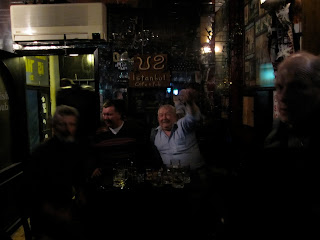I had a scary experience last night when a very sick colleague who lives across the hall pounded on my door in the middle of the night. Whether it was food poisoning or an allergic reaction – she has before gone into anaphylaxic shock and felt she was again – she'd called an ambulance via 999 and wanted me to wait with her until they arrived.
Until they arrived! I can only be thankful that her condition did not worsen, as I spent the next 30 or so minutes on the phone with the ambulance driver, finally running blocks away because it is pretty hard to convey a set of directions that involve four major cross streets, a bunch of left and right turns, one university, a place called "White Cat Laundry" and a series of other minor landmarks I was too tired and confused to remember.
There is no street addressing system in Abu Dhabi - the city is due one by the end of the year - and I have heard tales before of people who try to get ambulances and cop cars to them, seeing the lights and hearing the sirens but not being able to direct them closer. Now I know why the US Overseas Security Advisory Council advises that those who move to the city prepare a set of workable directions that can be kept by the phone, and that they make sure the emergency operator fully understands them. Getting an ambulance to one's house is a little different than inviting a bunch of people over for a dinner party. There is no luxury of time.
This is a place that survives on landmarks. I even wrote about this for the Globe and Mail last year, and just to give you an idea of what it is like, here is an excerpt:
Julie Greenhalgh, a British expatriate, has lived in the capital for seven years and runs a reflexology business out of her home. Without any major landmarks to reference in her neighbourhood, she e-mails her clients a map and provides a series of directions that includes "a mosque on the right, a low yellow building that's a new school ... two buildings that used to be yellow and now are brown," the colour of her villa, the pink bougainvillea draped over its walls, and her sandy-coloured Mitsubishi SUV parked outside.
"I'd say 70 per cent of my clients still can't find it," she said. "I'm used to standing in street waving."But try to remember landmarks when you think a person could be dying! Last night I had a paramedic telling me repeatedly he was by "Technical Scissors", a store on Muroor Road almost one major city block from our place. I tried to direct him to us, saying he should head to the Corniche, turn left and then a quick right. But I quickly grew defeated as I wondered how to navigate past all the twisty turny roads to our place. It didn't help that every time I asked him where he was, he said "Technical Scissors". At one point he was a block away, heading in the wrong direction. I was running towards the store, now far away from a very sick friend, when I found this out. I am ashamed to say that a few minutes later when I asked him where he was and he said "Technical Scissors", I began to scream "how is it possible that can you be at Technical Scissors again???" (To his credit, he simply asked me not to yell at him. Later, when we were chatting as our patient was being loaded into the ambulance and we were having a debrief - and after I apologised - I mentioned Technical Scissors. He smiled and said "let's not talk about Technical Scissors".)
Alls well that ends well, and she is recovering in hospital and I am about to have a big nap. As soon as I wake I am doing exactly as the US Overseas Security Advisory Council advises and keeping clear instructions by the phone. What if it was life and death and there was not 30 minutes to spare? After experiencing what it is like to get an ambulance while groggy, panicked and dealing with the ever-present language barrier, in a city that waits for street names and numbers that all of its residents will follow and use, in an apartment building that might as well be hidden, I implore anyone who reads this (and hopefully all the friends, family and colleagues they tell) to do the same.

























